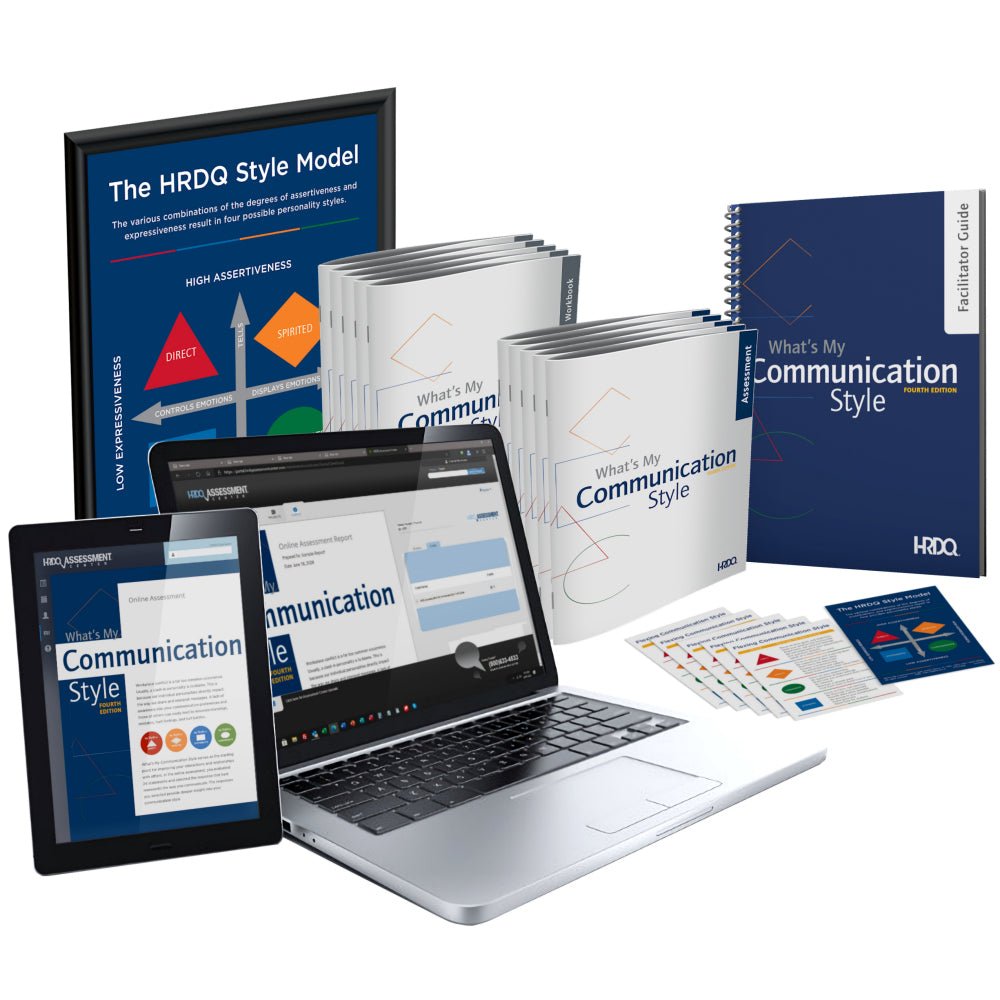Share
Professional Development: What Is It and Why Is It So Important?
Bradford R. GlaserNo one is born an expert. We all need to learn and grow, whether it's part of personal relationships, general learning, or professional advancement.
Professional development is a core part of learning and growing in your career – it’s there to help you reach your full potential. When we say professional development, we don't just mean self-guided learning on the job; actual professional development opportunities are sponsored and organized by the company itself. So, what, specifically, is professional development? How does it work, and how can you benefit from it?

- Identify personal style
- Improve communication skills
- Create an action plan
Table of Contents
Defining Professional Development
In a broad sense, anything you learn on the job that helps you better perform your duties is part of professional development. However, when most people talk about professional development, they specifically mean continuing education, training, and certifications that help employees do their jobs more effectively and reach their career goals. Professional development encompasses various activities and programs designed to enhance your skills, knowledge, and overall effectiveness in the workplace. These can include online courses, workshops, training sessions, conferences, seminars, and formal education programs. The goal is to help employees expand their capabilities, stay current in their field, and prepare for future challenges.
Some industries require these learning experiences as part of remaining employed. For example, in healthcare, states often mandate that nurses partake in a certain amount of continued education to maintain certification and remain employed and practice medicine. Many fields with specific licenses to operate have similar continuing education requirements.

In addition to employment requirements, continuing education and professional development is a crucial part of providing appropriate service. Industries change and evolve. "Best practices" change and can even reverse course when new information discovers an old practice is, actually, harmful. New tools, new conventions, and new skills become necessary.
Professional development is not limited to the bare minimum necessary to remain employed. It can also be part of ongoing improvement in your skills and knowledge, which opens up opportunities for career advancement, both within your organization and without. Moreover, professional development can lead to increased job satisfaction, motivation, career growth, and overall engagement in the workplace.
Why Employees Should Pursue Professional Development
As an employee, professional development has three primary effects.
First, it makes you better at your job. Professional development is a catch-all for any continued learning and education or training you pursue as an employee, related to your job. You might learn newer ways of performing your duties. You might cross-train in another department, so you better know what they're looking for out of your work. To make you a more effective communicator, you might learn better methods for communicating or engaging with coworkers, customers, and clients.
Second, it builds confidence in your skills. When you're better at your job and more aware of your capabilities, you can act more confidently. Reducing imposter syndrome can, among other things, reduce stress in your career. Confidence in your skills and abilities is also essential for leadership and management positions.
Third, it opens up room for professional growth and additional career opportunities. Promotion from entry-level to senior roles to management roles – to the point where you are comfortable with your lifestyle and satisfied with your position – is crucial for job satisfaction and career longevity. "Working your way up the corporate ladder" may not be the dream of every employee, but it's a goal for many.

Of course, this avenue to advancement applies both internally and externally. If your company does not offer opportunities for advancement, you can take your skills and knowledge to other organizations.
Another benefit of professional development is networking. Often, professional development involves attending classes, seminars, online training, or other external education programs, which allows you to meet others within your industry. Given that we live in a world where career advancement is often more about who you know than what you know, networking can be invaluable.
All the while, professional development can teach you new skills and methods of communication that can help you:
- Resolve conflicts in a more meaningful, satisfactory way.
- Better communicate your perspectives to reduce miscommunication.
- Reduce stress caused by interpersonal drama in the workplace.
Professional development is of massive benefit to employees who have ambitions and is required for many industries where best practices are not simply a suggestion but a matter of safety and health.
Why Employers Should Encourage Professional Development
Professional development has many benefits for employees, but that's not all. Employers must invest in training programs, assessment packages, and other learning opportunities to assist professional development. Thus, employers must have a reason to do so. After all, why would a company pay to train workers who will take that training outside of the organization? Luckily, there are many benefits of professional development to the employer, as well as to the employee.
Professional development increases employee retention. When an employee is faced with choosing between working for a company that invests in their skills and future and offers routes for advancement, or a company full of unknowns, they are more likely to stick with their current employer (all else being equal.)
Of course, this requires investment in more than just development. Your company must provide those avenues for advancement, and there are other factors (like poor company culture, poor management, or workplace discrimination) that can counteract even the best professional development plans.
Professional development allows institutional experience to "trickle up." If a mid- or high-level employee retires or otherwise leaves the company, you can promote from within to fill that role. People you have already trained and already know can handle the job can be promoted into that job. Another lower-level employee can then fill their role, and so on. Eventually, you find that you only need to go through the hiring process for relatively inexpensive, entry-level positions.

This is not to say that professional development takes the place of bringing in outside talent. External hires can and should still be considered, and sometimes bringing in an outside perspective is just what your organization needs. However, it's a balance that would otherwise tilt solely in favor of external hires.
Professional development helps maintain compliance. Even if continued education isn't part of it, many industries are regulated by overall compliance monitoring. However, the regulations and standards can change and evolve, which means you need continued education to adjust to those changes.
Professional development reduces stagnation and increases creativity. When you invest in your employees' skills, abilities, and knowledge, you bring all of that value back to your organization. It can then be leveraged to help advance and improve your products, your service, and more.
What Does Professional Development Look Like?
Professional development can take many forms.
At the most basic, professional development can mean continuous learning through internal mentoring and teamwork, where individuals can learn and build their skills. Simply working in a role over time will present an employee with challenges that require skills or knowledge they don't have; learning those skills or finding that knowledge improves their abilities, which is a form of professional development.
However, this form of casual, ongoing education and experience growth is not usually what we refer to as actual professional development. "True" professional development is an investment guided by the company. Here are some examples of professional development learning opportunities:
Attending in-person industry or role-centric conferences. These can be small conferences for a local area or region or national, annual conventions that attract thousands of attendees in the profession. Typically, a company can send a representative who can bring back important knowledge to impart to the rest of the organization, as well as their own development.
Attending and participating in skill-relevant webinars or seminars. Seminars are often like bite-sized conferences, with a single authority figure speaking on their subject. When conducted online as webinars, the barrier to entry is much lower, though the value doesn't have to be.
Attending dedicated continued education classes for the role or industry. In particular, for roles and industries with specific continued education requirements, there are dedicated classes and frameworks for that task that can build upon existing skills and refine best practices.
Joining and participating in relevant workshops. Workshops are often groups of learners guided by an industry authority figure to analyze an issue or work on a specific task, with training as a central goal. These can be great for particular skills, networking, and exposure to new ideas.

Making use of a "microlearning" framework managed by the company. Microlearning often involves small, discrete tasks that can be done in just a few minutes to teach a new fact or skill integrated throughout the workday. They can be highly effective as a slow-burn skill-building framework.
Cross-training and job shadowing within other roles and departments. Cross-training and job shadowing can expose an employee to new perspectives or new skills and possibly even encourage them into lateral movement for career benefit rather than simply being siloed vertically.
Taking guided or self-guided assessments to analyze skills, and training modules to build upon them. Self-assessments can help benchmark a person's skills or personal attributes and then find an appropriate training module to build awareness, mindfulness, and enhanced skills for better workplace efficacy.
Taking classes and tests to earn specific certifications or licenses relevant to the industry. Sometimes, professional development can have discrete milestones, such as earning a particular certification or license that can open up new doors or new responsibilities within an organization.
No matter the form, high-quality professional development is all focused on one thing: improving an employee's ability to perform their job.
Our Recommended Avenues for Professional Development
Generally, you can divide professional development into two categories.
The first category is role-relevant skills, certifications, and education. These forms of professional development are highly specific, so making general recommendations is better left to experts in a given industry. The training an IT professional undergoes will be different from the training an HR professional or a finance manager will take.

The second category is personal development in a professional setting. This category is where our inventory of training products comes into play. We offer many different modules and assessments to assist with employees' professional development across the board, typically on an interpersonal axis. For example:
What's My Communication Style?
The What's My Communication Style assessment is a variation of the DISC personality assessment and helps build self-awareness of an employee's default means of communication and interpersonal engagement.

The goal here is not to "fix" anyone or push every employee into the same mold. Instead, it is to build awareness of both the advantages and the shortcomings of an individual's default perspective and means of communication.
Armed with this awareness, the employee can leverage techniques to improve the strengths and mitigate the shortcomings inherent in their communication skills. That allows them to be a better communicator, resolving interpersonal conflicts and avoiding issues with any personal drama that can get in the way of effective work.
Personal Style Inventory
The Personal Style Inventory is a combination of assessment and workshop similar to the communication style assessment. However, rather than focusing solely on communication, the Personal Style Inventory assesses many personality traits, including:
- Introversion vs. extroversion
- Sensing vs. intuiting
- Thinking vs. feeling
- Perceiving vs. judging
Using a 32-statement assessment, employees can discover where they fall on these spectrums and use that self-awareness to identify potential problems in their work interactions, particularly with people who conflict with their styles. The workshop guides this process and encourages further personal and professional development, including developing a skill set that can carry over into personal lives and further career growth.

These two options are just an example of the variety of assessments, workshops, and professional development programs we have to offer. Feel free to browse the rest of our store and pick up any workshops or professional development tools you feel your workplace could use. There's something there for everyone, from entry-level sales to upper management.
Professional development is an ongoing process and can be relevant to anyone from the freshest new hire to the most established executives. Never stop growing, learning, and pushing the boundaries of innovation.
Companies that invest in ongoing professional development opportunities across all levels of their organization, from mentorship to annual conferences to micro-learning to across-the-board assessments, tend to be the most effective and productive firms on the planet. Are you one of them?
Do you or your company have any questions about professional development? If so, please feel free to leave a comment down below, and we'll get back to you! We make it a point to reply to every question we receive and would be more than happy to assist you by answering any questions you may have!





















































